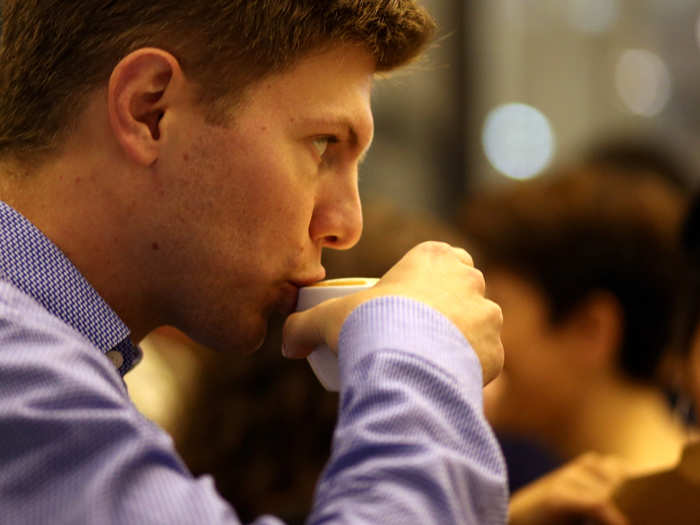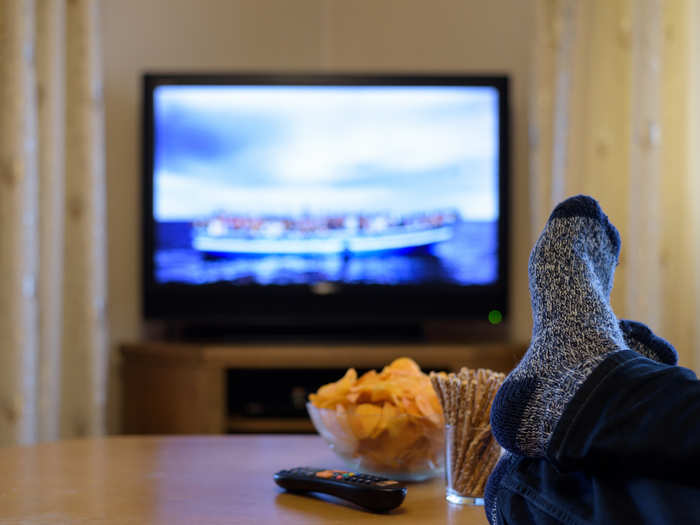- Home
- slideshows
- miscellaneous
- 7 simple things everyone can cut out of their life right now to reduce anxiety, according to a psychotherapist
7 simple things everyone can cut out of their life right now to reduce anxiety, according to a psychotherapist
1. Sleeping with your smartphone in your room

2. Watching the news

Studies consistently show that watching the news raises our anxiety. This makes sense given that most news stations report the bad news — catastrophic events, tragic accidents, and economic disasters are among the norm.
And these days, it's hard to escape the news. In addition to newspapers and TV news, we're bombarded with the latest stories on social media throughout the day, and our inboxes get flooded with newsletters mentioning the latest doom and gloom.
And perhaps the most discouraging part of all is that your anxiety levels might stay high long after you stop watching the news. A 2007 study published in the International Journal of Televised Medicine found that participants' anxiety levels remained high after watching the news even when they were engaged in an activity meant to distract them. Participants who engaged in an active relaxation strategy — like progressive muscle relaxation—were able to calm themselves. But of course, most of us don't turn to relaxation strategies after we consume news.
3. Caffeine

Caffeine and anxiety can be a vicious cycle. Anxiety can impact your ability to sleep. To help you stay awake during the day, you may depend on coffee or energy drinks.
Studies show that caffeine increases anxiety. Not only might you feel more anxious after consuming caffeine, but you also might have more difficulty sleeping at night. The cycle often repeats itself.
Of course, it's hard to cut back on caffeine if you've become psychologically or even physically dependent on it. You may need to reduce your intake slowly if you're a heavy caffeine consumer.
4. Alcohol

Anxiety and alcohol use can also be a two-way street. You might turn to alcohol to help you cope with stress when you're in an anxiety-provoking social situation. But alcohol can increase your anxiety in the long-term.
Many studies have linked anxiety with alcohol, and it's clear that individuals with anxiety disorders are at a higher risk of developing substance abuse issues. One study found that alcohol dependence is almost four times higher in individuals who use alcohol to cope with anxiety.
Reducing — or eliminating — alcohol altogether might seem like a tough proposition, but it could greatly decrease your anxiety in the long-term. Don't be afraid to seek professional help. Anxiety is one of the most treatable yet undertreated psychiatric conditions.
5. TV before bed

While you might think a few minutes of TV help you unwind before bed, watching a show at bedtime affects your sleep in the opposite way.
Studies show that the light emitted from a TV (or any digital screen) interferes with your circadian rhythms. Your body produces melatonin when it's dark as your brain prepares your body for sleep. Watching TV interferes with that process. It can delay your REM sleep — which causes many people to feel anxious.
It may also leave you feeling more tired the next day, which in turn may cause you to depend more on caffeine to stay awake, which can fuel your anxiety.
6. Commiserating with your friends

You might feel that complaining to your friends or family members helps you release pent-up feelings of frustration. But studies show that you don't need to "vent" your frustration. In fact, complaining is likely to make you feel worse rather than better.
When you encounter stressful events, your body releases a stress hormone called cortisol. Studies show that complaining about an event amplifies the release of cortisol — especially in women. Increased cortisol can have damaging effects on the body, including headaches, high blood pressure, chest pain, and difficulty sleeping — all of which can amplify your anxiety.
So rather than dwell on your problems, your time is much better spent searching for solutions. Active problem-solving may relieve your anxiety, while talking about your problems is more likely to keep you stuck in a perpetual state of anxiety.
7. Buying things you can't afford

When asked about their biggest source of anxiety, most Americans say they worry most about bills — and their inability to pay them.
While some people are likely struggling to meet their basic needs, many others find themselves deeply in debt due to living above their means.
Social media has brought the desire to "keep up with the Joneses" to a whole new level. It only takes a few minutes of scrolling through Instagram to feel like everyone else has things you want. And online shopping makes it easier than ever to buy things you can't really afford.
A little "retail therapy" may make you feel good for a minute. But it backfires in the long-term when you can't afford to pay your bills.
Popular Right Now
Popular Keywords
Advertisement